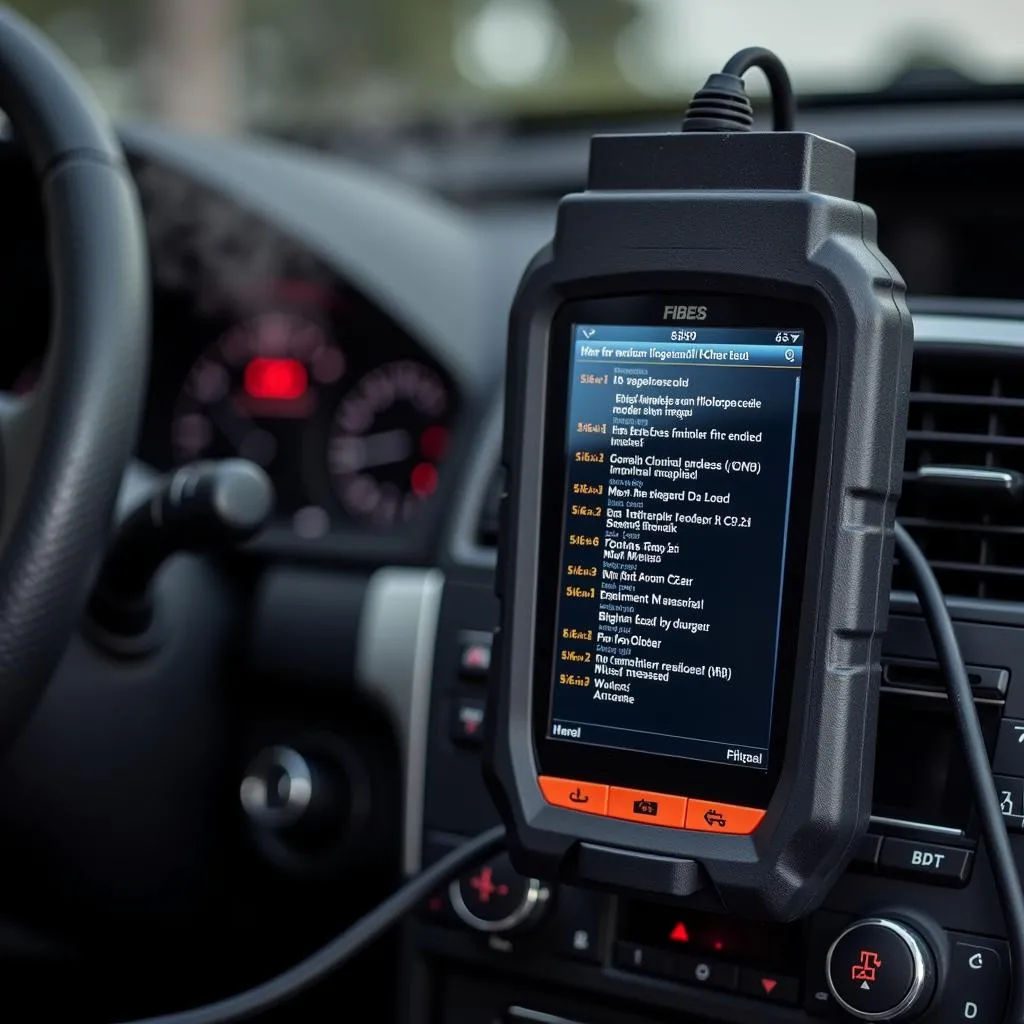You turn the key, the engine roars to life, and everything seems fine – until you notice the temperature gauge creeping up. Overheating is a common car problem that can be caused by a variety of issues, leaving many wondering, “Can an OBD reader tell why my car is running hot?” The answer, like many things in the automotive world, is both yes and no.
 OBD reader plugged in showing engine codes
OBD reader plugged in showing engine codes
Understanding OBD Readers and Engine Temperature
OBD, or On-Board Diagnostics, readers are handy tools that communicate with your car’s computer. They access and interpret Diagnostic Trouble Codes (DTCs) stored in the Engine Control Unit (ECU). These codes act as clues, pointing towards potential problems within your car’s various systems. While some codes directly relate to engine temperature, others may highlight underlying issues that indirectly contribute to overheating.
For example, a faulty thermostat, a common culprit for overheating, might trigger a DTC related to the engine coolant temperature sensor. Similarly, a malfunctioning cooling fan, another frequent offender, might trigger a code related to the fan control circuit.
how to use hand-held obd scanner
When an OBD Reader Can Pinpoint the Problem
In many cases, an OBD reader can provide valuable insights into why your car is overheating. Here are some instances where it can directly identify the issue:
- Coolant Temperature Sensor Failure: This sensor plays a critical role in informing the ECU about your engine’s coolant temperature. A faulty sensor can send inaccurate readings, leading to improper cooling system management and overheating. An OBD reader can typically detect a malfunctioning sensor.
- Thermostat Malfunction: The thermostat regulates coolant flow through the engine. A stuck-closed thermostat restricts coolant circulation, causing the engine to overheat. An OBD reader can often detect this issue through related DTCs.
- Cooling Fan Problems: Electric cooling fans play a vital role in dissipating heat from the radiator. If the fan fails or its control circuit malfunctions, the engine can overheat, especially at low speeds or idle. An OBD reader may identify issues with the fan control circuit.
When an OBD Reader Needs Help
While a powerful tool, an OBD reader isn’t a magic crystal ball. Sometimes, it can highlight areas of concern, but further investigation is necessary.
 Mechanic inspecting car engine for overheating
Mechanic inspecting car engine for overheating
- Low Coolant Level: One of the most common causes of overheating is simply a low coolant level. This could be due to a leak in the system or inadequate coolant. Unfortunately, an OBD reader cannot detect a low coolant level directly.
- Water Pump Failure: The water pump circulates coolant throughout the engine. If it fails, the coolant can’t move, leading to rapid overheating. While some vehicles may generate codes related to water pump performance, it’s not always the case.
- Clogged Radiator: A radiator clogged with debris can’t efficiently dissipate heat, leading to overheating. An OBD reader won’t directly identify a clogged radiator.
- Head Gasket Issues: A blown head gasket, a more serious problem, can cause overheating. While an OBD reader might detect related issues, such as exhaust gases in the cooling system, it may not pinpoint the head gasket itself.
best obd scanner for diy toyota forum
What to Do When Your Car is Running Hot
Overheating can cause serious engine damage if not addressed promptly. Here’s what to do:
- Pull over safely. As soon as you notice the temperature gauge rising, find a safe place to pull over. Continuing to drive with an overheating engine can cause significant and costly damage.
- Turn off the engine. This reduces the heat generated and allows the engine to cool down.
- Do not open the radiator cap while the engine is hot! The cooling system is under pressure, and hot coolant can spray out, causing severe burns.
- Check the coolant level once the engine has cooled down. If the level is low, carefully add a 50/50 mix of coolant and water.
- Use your OBD reader to check for codes (if available). This information can be helpful when seeking professional assistance.
- If the problem persists or you are unsure about the cause, it’s best to have your vehicle towed to a qualified mechanic.
Using an OBD Reader Effectively
To make the most of your OBD reader:
- Invest in a quality reader. While basic code readers are helpful, more advanced models offer live data streaming and enhanced diagnostic capabilities.
- Familiarize yourself with your car’s specific codes. Different manufacturers may use slightly different code interpretations.
- Don’t rely solely on the reader. Use it as a diagnostic tool in conjunction with visual inspections and your own mechanical knowledge.
actron obd scanner that reads trans temp
Conclusion
An OBD reader can be a valuable asset in identifying the reason behind your car’s overheating issue. While it may not always pinpoint the exact cause, it can provide crucial clues and help you determine the best course of action. Remember, regular maintenance, including monitoring coolant levels and addressing potential problems early, is key to preventing overheating and prolonging the life of your engine. If you’re ever in doubt about your car’s health, seeking professional mechanical assistance is always a wise decision.
FAQs
1. Will any OBD reader work for engine temperature codes?
Most OBD-II compliant readers (for cars made after 1996) can read basic engine codes, including some related to engine temperature. However, more advanced readers might offer live data readings and more specific information.
2. Can an OBD reader detect a leak in the cooling system?
No, an OBD reader cannot directly detect a leak in your cooling system. However, it might detect codes related to low coolant levels, which could indicate a leak.
3. Should I replace my car’s thermostat as soon as I get a related code?
Not necessarily. While a code related to the thermostat might indicate a problem, further diagnosis might be needed. It’s best to consult a mechanic.
4. How often should I check my car’s coolant level?
It’s a good practice to check your coolant level at least once a month, and more frequently during hot weather conditions.
5. Can I use plain water instead of coolant?
It’s not recommended to use plain water in your cooling system. Coolant contains additives that prevent corrosion, lubricate the water pump, and raise the boiling point of the liquid, offering better protection for your engine.
Need more help? Contact us on WhatsApp: +1(641)206-8880, Email: [email protected] or visit us at 276 Reock St, City of Orange, NJ 07050, United States. We have a 24/7 customer support team ready to assist you.
